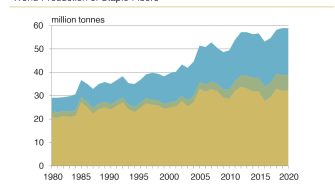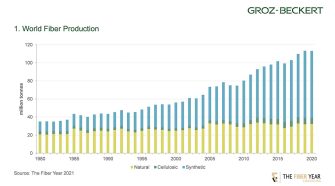
World supply – highlights in upstream business
World supply was pushed by manmade fibers but century’s average annual growth rate was missed in the third consecutive year and adverse conditions prevailing make a return to the long-term …

The Fiber Year 2022 – Advance notice and key findings
Work for The Fiber Year 2022 still is in full swing when writing this article at the beginning of May. Early information on strategic enrichments and key findings in the …

The Fiber Year 2021 – spun and filament yarn production
Significant collapse in 2020 demand across the globe has affected global yarn manufacturing that fell 4%, with filaments weathering tough conditions surprisingly well, while spun yarns suffered from an above-average …

The Fiber Year 2021 – world staple fibers
Global supply of staple fibers in 2020 accounted for nearly 59 million tonnes, 52% of the world fiber and yarn market. Their share continuously diminished from more than 80% in …

The Fabric Year 2021 – Holistic approach from fibers to fabrics
The Fabric Year, a result of the cooperation between Groz-Beckert and The Fiber Year GmbH, now in its seventh edition delivered insights into textile markets, taking a holistic approach from …

